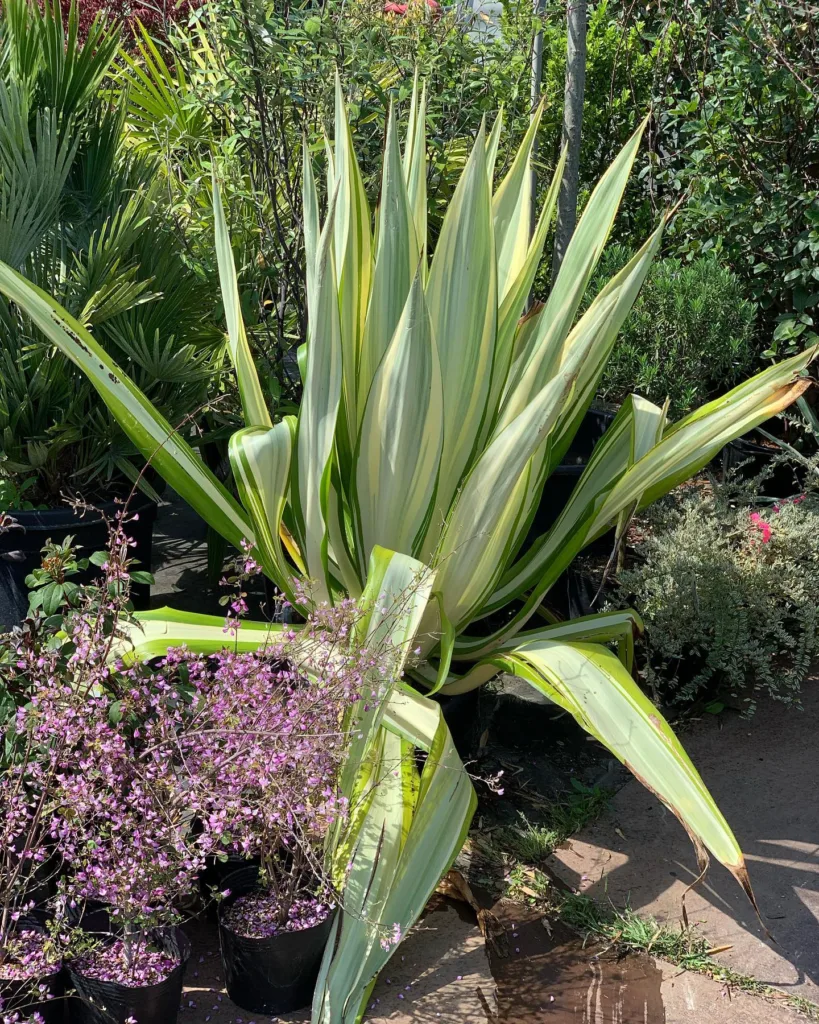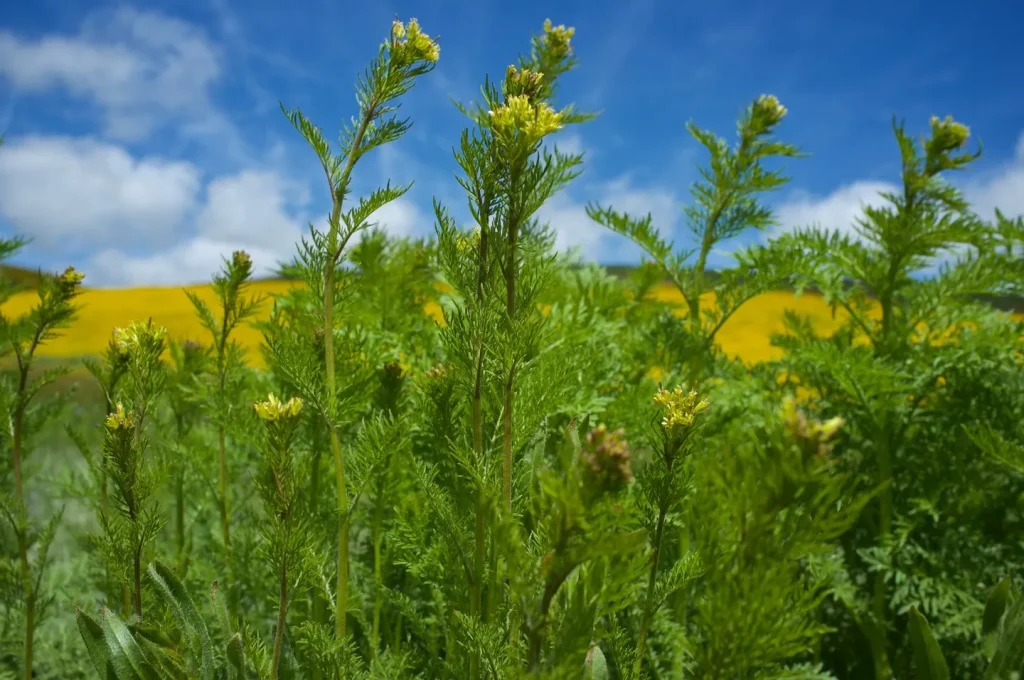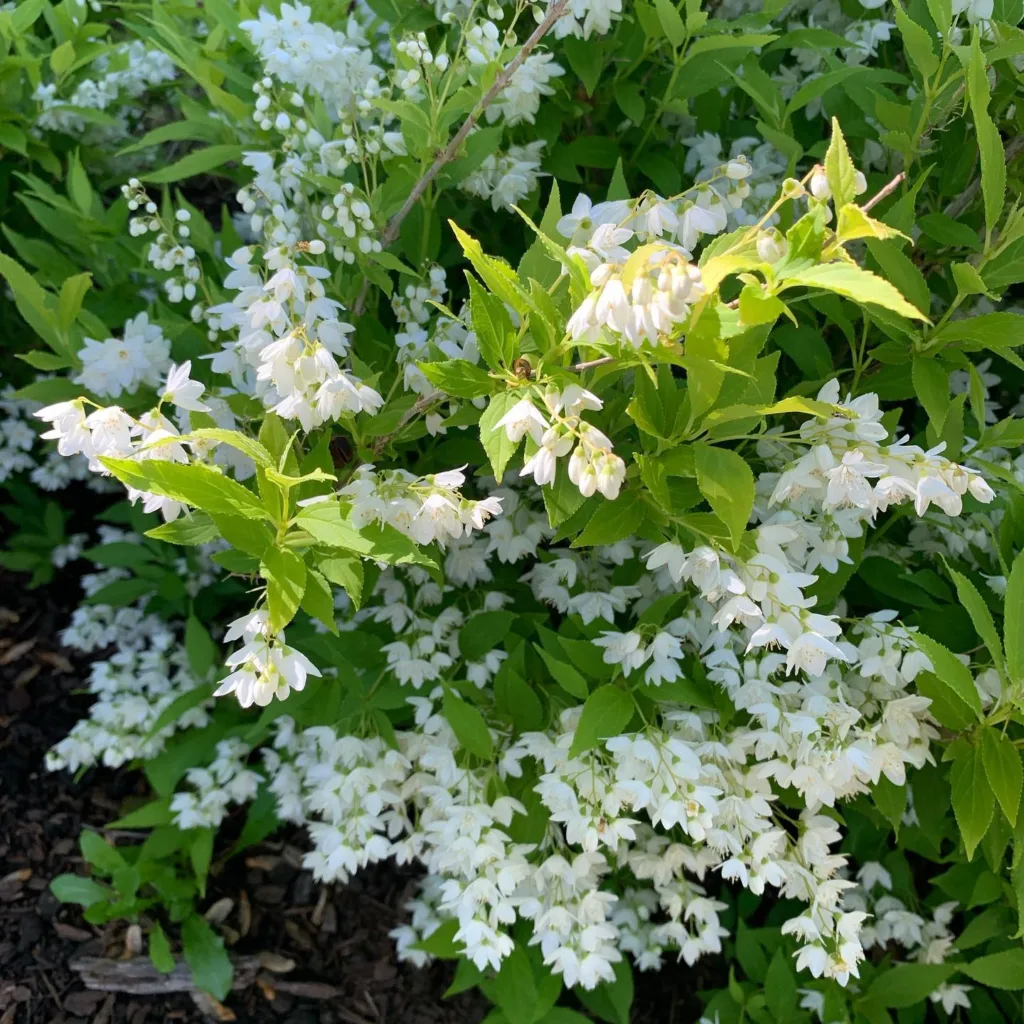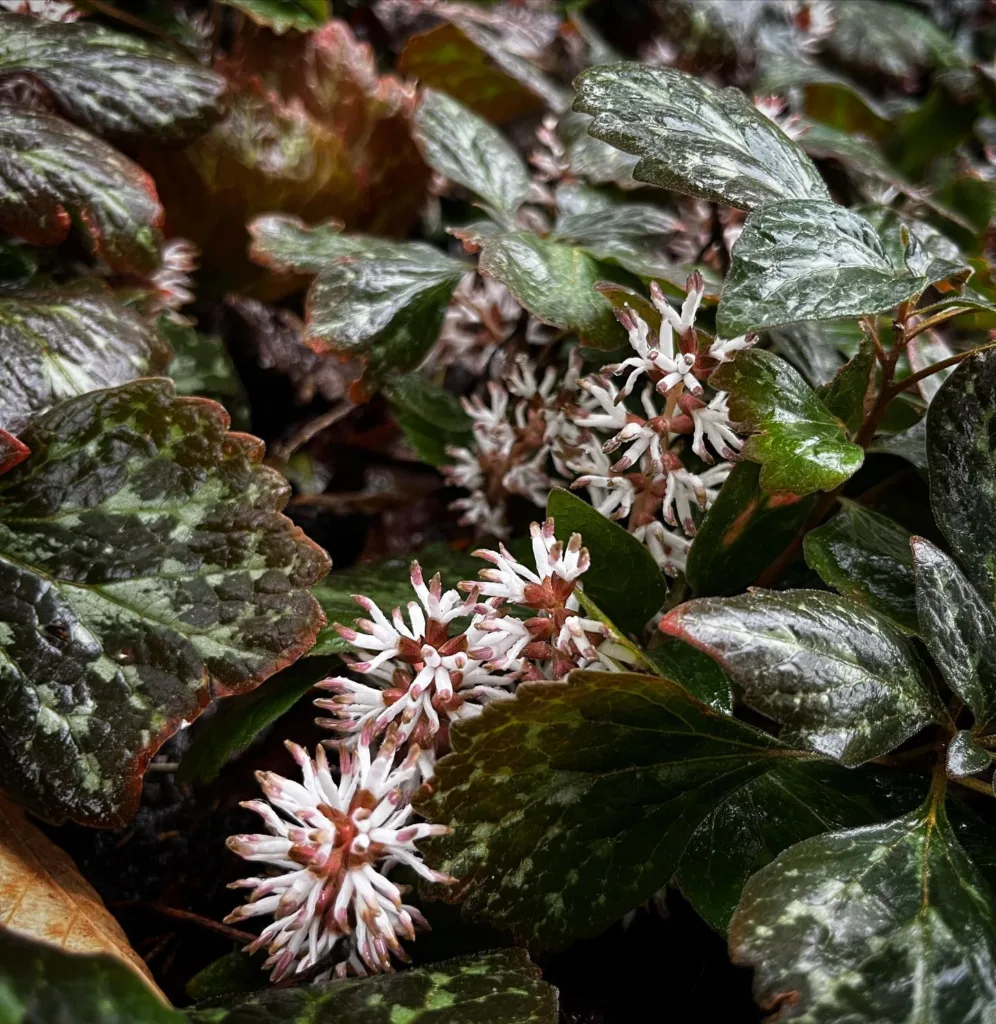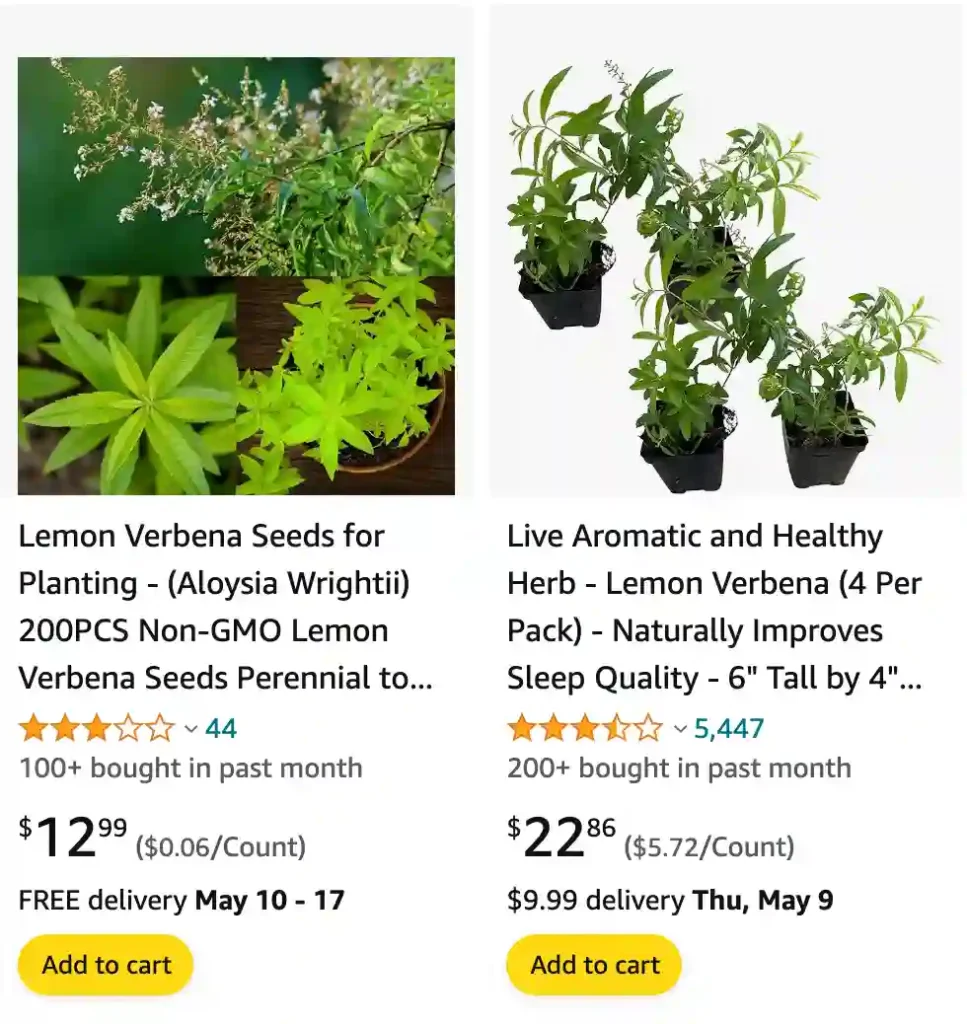
What is lemon verbena?
Lemon verbena is this amazing herb I recently discovered that smells exactly like lemons, but even better! It’s like someone bottled up sunshine and a citrus grove. I found a little pot of it at the farmer’s market last week, and I’ve been obsessed ever since. Just brushing against the leaves releases this incredible lemony fragrance. I can’t wait to try it in some tea – I bet it’ll be way more interesting than my usual plain black tea.
Is lemon verbena a perennial?
That’s the tricky thing about lemon verbena! I read online that it’s a perennial in warm climates, but where I live it gets pretty cold in the winter. So, I’m not sure if it’ll survive outside. Some websites say you can bring it indoors over winter, but I’m not the greatest with keeping houseplants alive. Maybe I’ll try overwintering it this year, but I might just play it safe and buy a new plant each spring. Those lemony leaves are just too good to risk losing!
What to do with lemon verbena?
The minute I smelled those lemon verbena leaves, I knew they had to go in tea! I brewed a pot yesterday with just a few leaves, and it was fantastic. The lemony flavor was so refreshing, and it totally brightened up my afternoon. It was way more interesting than plain black tea, but still light and calming. I can’t wait to try it iced next! But I also read you can use it in desserts and savory dishes. Lemon verbena sugar cookies sound incredible, and I bet it would be amazing with chicken or fish. The possibilities seem endless – so many ways to add a burst of lemon sunshine to my cooking!
How to make lemon verbena tea?
Making lemon verbena tea is super easy and turns out so flavorful! I just tried it for the first time the other day. Here’s what I did: I grabbed a few fresh leaves from my lemon verbena plant, rinsed them quickly, and popped them in a mug. Then, I poured boiling water over the leaves and let it steep for about 5 minutes. That’s it! Straining the leaves is optional, but I prefer a clearer tea. The flavor was amazing – light and refreshing with a strong lemony taste. It was perfect for a hot afternoon pick-me-up. I can’t wait to experiment with steeping times and maybe adding a touch of honey for some sweetness!
How to use lemon verbena?
I’ve been having a blast discovering all the ways to use lemon verbena! It’s like having sunshine in a leafy package. Besides the delicious tea, I’ve been experimenting in a few other ways. For starters, I infused some sugar with lemon verbena leaves. I just crushed the leaves a bit to release the oils, mixed them with granulated sugar, and let it sit in a jar for a day. Strained out the leaves, and now I have lemony sugar for tea, cookies, or anything else that needs a citrusy kick! I also tried adding a sprig of lemon verbena to a pot of chicken with vegetables. The lemony scent filled the kitchen while it cooked, and the chicken ended up with this subtle, amazing flavor. It was so easy and really elevated the whole dish. Next on my list is using lemon verbena in a summery spritzer – sparkling water, a squeeze of fresh lemon, and a sprig of verbena sounds incredibly refreshing!
How to grow lemon verbena?
Growing lemon verbena has been a bit of a learning experience for me! It seems pretty easy in theory, but I’m still figuring out the best way to keep it happy here. I bought a small plant at the market this spring, and I planted it in a pot on my sunniest balcony. The leaves exploded with growth, and I’ve been enjoying them all summer. The only tricky part is remembering to water it – those leaves can wilt fast if it gets too dry! From what I’ve read online, I might need to bring it indoors before the frost hits in fall. I’m not sure how I’ll fare with keeping it alive over winter, but I might try replicating a sunny window situation and keep the watering consistent. If all else fails, I know at least where to find a new plant next spring – those lemony leaves are worth the effort!
How to propagate lemon verbena?
I haven’t actually tried propagating lemon verbena myself yet, but I’m definitely planning to this summer! From what I’ve been reading online, it seems pretty straightforward – taking cuttings in the warm weather and encouraging them to root. I’ll probably ask the vendor at the farmer’s market where I got my plant for some tips too. They seem like real experts on all things herbs. But anyway, the plan is to snip off a few healthy stem tips in late summer, pot them up in some fresh potting mix, and keep them moist and warm in a bright spot (not direct sunlight though!). Some people recommend using a clear plastic bag to create a mini greenhouse around the cuttings to boost humidity. Hopefully, with a little care, I’ll have some baby lemon verbena plants to nurture over winter and enjoy next year! It’ll be exciting to see if I can grow my own little supply of this amazing lemony herb.
What does lemon verbena smell like?
The scent of lemon verbena is absolutely delightful! It’s like sunshine captured in a leaf. Imagine the zest of a freshly cut lemon, but brighter and airier. There’s a clean, herbal touch to it too, almost like walking through a lush garden after a citrusy summer rain. It’s invigorating and calming at the same time. The first time I brushed against the leaves, I was hooked – it’s such a unique and cheerful fragrance. It’s no wonder they use it in all sorts of soaps and candles – it’s like a natural mood booster!
What is lemon verbena good for?
In my experience, lemon verbena is a fantastic all-arounder! Here’s how I’ve been enjoying it:
- Culinary delights: First and foremost, it makes the most amazing tea. It’s like sunshine in a cup, perfect for a pick-me-up. Plus, I’ve been playing with lemon verbena sugar for cookies and desserts, and it adds this bright citrusy twist that’s incredible. Even tried it with chicken and veggies – the subtle lemony flavor was amazing!
- Potpourri power: The leaves themselves are like natural air fresheners. I love crushing a few and placing them around the kitchen for a burst of lemony goodness.
- Relaxation remedy: I read it can help with stress and anxiety, and brewing a cup of lemon verbena tea before bed feels very calming. The scent itself is so cheerful and uplifting.
- Gardening fun: It’s been a bit of a challenge keeping it alive here in the colder months, but growing my own lemon verbena has been rewarding. Those fresh leaves are so much more fragrant than anything you can buy dried.
Overall, lemon verbena has become a bit of a sunshine staple in my life. It’s delicious, refreshing, and adds a touch of lemony magic to everything from my teacup to my garden!
How to harvest lemon verbena?
Harvesting my lemon verbena has become a regular (and delightful!) ritual. Here’s what I’ve learned:
- Snip for freshness: You can harvest leaves throughout the growing season, whenever you need a lemony boost. Just snip off individual leaves or sprigs with sharp shears or scissors.
- Morning magic: They say the essential oils are strongest in the morning, so that’s my favorite time to harvest.
- Bush it up: To encourage bushier growth, pinch off the top growth tips whenever you harvest. This will make the plant fuller and give you more leaves to enjoy.
- Big harvest: If your lemon verbena gets really bushy and you need a larger harvest, you can trim back entire stems by about a third to half. Don’t worry, it’ll bounce back quickly with all that new growth!
Just remember, the key is to be gentle and not take too much at once. This will keep your lemon verbena happy and producing those delicious lemony leaves all season long.
How to dry lemon verbena?
There are a couple ways I’ve been experimenting with drying lemon verbena, each with its own pros and cons. Here’s what I’ve found:
- Air drying: This is the simplest method. I just wash the leaves gently, pat them dry, and arrange them in a single layer on a baking sheet lined with parchment paper. Find a cool, dark, well-ventilated spot – like a spare room or a screened-in porch. Turning the leaves every day or so helps them dry evenly. It can take a few days to a week, depending on the humidity. This method is great for preserving the fragrance, but it takes the longest and you have to be careful about mold if it’s too humid.
- Dehydrator drying: If you’re impatient like me, and want to dry the leaves in a flash, a dehydrator is the way to go! Just wash and dry the leaves like with air drying, then spread them in a single layer on the dehydrator trays. Follow the instructions on your dehydrator for herbs, which is usually around 95-105 degrees Fahrenheit (35-40 degrees Celsius). This method can take as little as a few hours, and it’s great for ensuring the leaves dry completely to prevent mold. The downside is you might lose some of the delicate fragrance compared to air drying.
No matter which method you choose, the key is to make sure the leaves are completely dry and crumble easily when rubbed between your fingers. Once they’re dry, store them in an airtight container in a cool, dark place. That way, you can enjoy the sunshine-y lemon verbena flavor all year long!
Is lemon verbena edible?
Absolutely! Lemon verbena is not only edible, it’s a delightful and versatile ingredient. That’s what first drew me to it! The leaves have this amazing lemony scent and flavor that can be used in so many ways.
Here’s how I’ve been enjoying the edible side of lemon verbena:
- Tea time: My favorite way to use lemon verbena is definitely in tea. It brews into the most refreshing and uplifting cup, perfect for a hot afternoon or a calming bedtime drink.
- Culinary creativity: I’ve been experimenting with lemon verbena in the kitchen, and it’s been a blast! Lemon verbena sugar adds a bright citrus twist to cookies and desserts, and it’s fantastic with chicken or fish for a subtle lemony flavor.
- Salad sensations: Chopped fresh leaves can be added to salads for a burst of lemony freshness.
There are even recipes out there for using lemon verbena in jams, jellies, and even cocktails. It’s a truly versatile little herb! Just remember, when using lemon verbena in cooking, start with a little and taste as you go – the flavor can be quite potent.
Is lemon verbena safe during pregnancy?
While I love lemon verbena, I wouldn’t recommend it during pregnancy. Here’s the thing: I haven’t found any information that definitively says it’s safe for expecting moms. Most sources, like WebMD, say there just isn’t enough reliable research on the effects of lemon verbena on pregnant women.
When I’m pregnant, I tend to err on the side of caution with anything I ingest, especially herbs and supplements. It’s just not worth the risk. There are so many other delicious and pregnancy-safe ways to enjoy a refreshing drink or add some citrusy flavor to your food. Maybe some ginger tea or a squeeze of fresh lemon would hit the spot?
Definitely talk to your doctor about it if you’re curious, but for now, I’d hold off on the lemon verbena until after the baby arrives. Then, you can get back to enjoying all that lemony goodness!
Does lemon verbena repel bugs?
In my experience, lemon verbena definitely seems to have some bug-repelling properties! The strong lemony scent is pretty overpowering to us, but apparently not too pleasant for some flying visitors.
Here’s what I’ve noticed:
- Mosquito mayhem: I haven’t had nearly as many mosquito problems on my porch since planting lemon verbena there. I wouldn’t say it completely eliminates them, but it definitely seems to keep them at bay.
- Fly foes: Crushing a few leaves and placing them around the kitchen seems to deter fruit flies. Not a foolproof method, but it helps!
It’s important to remember that it might not work on every bug, and the scent probably weakens over time. But as a natural, non-chemical way to keep pesky bugs at bay, lemon verbena is a winner in my book!
Is lemon verbena safe for dogs?
While lemon verbena smells amazing and has lots of great uses, I would caution against letting dogs around it. Here’s why:
- Mixed messages: I found conflicting information online. Some sources say lemon verbena is generally safe for dogs in small amounts. Others, like the ASPCA, list it as toxic.
- Better safe than sorry: Since it can potentially cause stomach upset, vomiting, or worse in large quantities, I wouldn’t risk it. Dogs are curious creatures and might nibble on the leaves if they get the chance.
- Lemony alternatives: There are plenty of dog-safe herbs out there that you can plant or use as treats. Chamomile, peppermint, and even some basil varieties are considered safe for dogs in moderation.
So, while I love lemon verbena, I’d keep it out of reach of furry friends. Their health and safety come first! Maybe plant some catnip nearby – that should keep them happy and distracted from the lemony goodness.
Does lemon verbena keep mosquitoes away?
Lemon verbena might offer some protection against mosquitoes, but it’s not a guaranteed force field. Here’s the breakdown based on my experience and what I’ve read:
- Repellent Power: The strong citrusy scent of lemon verbena is known to be disliked by mosquitoes. Having a lemon verbena plant around my porch seems to deter them a bit – I don’t get swarmed nearly as much when I’m sitting out there.
- Not Foolproof: It’s important to remember that the scent weakens over time, and it probably won’t completely eliminate mosquitoes from your entire yard. Think of it as a natural buffer zone, not an invisibility cloak.
- Citronella Comparison: Citronella is a more established mosquito repellent, and it’s often the main ingredient in commercial bug sprays. While lemon verbena might not be quite as strong, it’s a natural and pleasant-smelling alternative.
Overall: Lemon verbena can be a helpful addition to your mosquito-fighting arsenal, but it’s best used in combination with other methods like citronella candles or wearing long sleeves and pants when outdoors for extended periods.
How to prune lemon verbena?
Pruning my lemon verbena has become a part of my gardening routine, and it’s helped me keep a happy, bushy plant throughout the season. Here’s what I’ve learned:
- Spring Snipping: The main pruning happens in spring, shortly after you see new growth. This encourages bushier growth and helps remove any winter damage. I go in with sharp shears and cut back any dead or weak stems all the way down to the base. For older, woody growth, I’ll cut them back to about 2 inches (5 cm) from the ground.
- Summer Shaping: If your lemon verbena starts to look leggy in late spring or early summer, don’t be afraid to give it a haircut! You can trim the plant back by about a quarter of its height after the first flush of blooms appears. This will encourage it to branch out more and produce even more leaves.
- Pinch those Tips: Whenever you harvest leaves throughout the season, you can also pinch off the top growth tips. This will prevent the plant from getting too leggy and will promote bushier growth overall.
Remember, the key is to be gentle and not take off too much at once. This will keep your lemon verbena happy and producing those lovely lemony leaves all season long!
Is lemon verbena invasive?
In my experience with lemon verbena, it hasn’t been invasive in my climate, but it depends where you live. Here’s what I’ve found:
- Warm Weather Wanderer: I read online that lemon verbena can be invasive in warm, moist climates. That’s because the mild winters and plenty of rain create ideal conditions for it to spread aggressively through self-seeding or root suckers.
- Contained in Cooler Climates: Here, where the winters get colder, my lemon verbena behaves itself. It dies back in the fall and needs to be replanted or brought indoors each year. So, it doesn’t have the chance to take over the garden.
- Check Before You Plant: The best way to know for sure is to check with your local gardening experts or extension office. They can tell you if lemon verbena is known to be invasive in your area. There might even be specific varieties that are less likely to spread.
- Responsible Planting: If you do plant lemon verbena and live in a warmer climate, it’s wise to keep it in a pot or a raised bed. This will help contain its growth and prevent it from taking over your flower beds.
So, the invasiveness of lemon verbena really depends on your location. But with a little research and responsible planting, you can enjoy this delightful herb without worrying about it becoming a garden bully.
Is lemon verbena safe for cats?
While lemon verbena might smell amazing to us, it’s best to keep it out of reach of curious kitties. Here’s why:
- Toxic Trouble: The American Society for the Prevention of Cruelty to Animals (ASPCA) lists lemon verbena as toxic to cats, along with dogs and horses. The essential oils in the leaves can cause stomach upset, vomiting, and even worse in large quantities.
- Feline Friendliness: Cats are notorious for nibbling on houseplants, and lemon verbena’s lemony scent might be too tempting to resist. It’s better to be safe than sorry and avoid any potential health risks.
- Cat-Safe Scents: The good news is there are plenty of cat-friendly herbs you can grow or use as treats. Catnip is a classic, of course, but there are others like oat grass, lemongrass (different from lemon verbena!), and even some varieties of mint.
So, as much as I love lemon verbena, I’d definitely create a kitty-free zone around it. Their health comes first! Maybe plant some catnip nearby to keep them happy and distracted from the lemony goodness.
Are lemon balm and lemon verbena the same?
Lemon balm and lemon verbena are often confused for each other, but they’re actually quite different! Here’s the breakdown based on my experience and some browsing online:
- Looks: Lemon balm has softer, rounder leaves with scalloped edges. Lemon verbena has longer, thinner leaves with smooth edges.
- Scent: While both have a lemony aroma, lemon balm has a sweeter, more herbal scent. Lemon verbena’s lemony fragrance is brighter and more intense.
- Flavor: Lemon balm’s flavor is milder and slightly minty, while lemon verbena packs a stronger lemon punch.
- Plant Family: Lemon balm is part of the mint family (Lamiaceae), while lemon verbena belongs to the verbena family (Verbenaceae).
- Uses: Both are fantastic herbs! I love lemon balm in tea for its calming properties. Lemon verbena, with its stronger flavor, shines in desserts, savory dishes, and even as a natural bug repellent.
So, even though they share that lovely lemony quality, lemon balm and lemon verbena are distinct herbs, each with its own unique qualities and uses.
If i die, water my plants!
